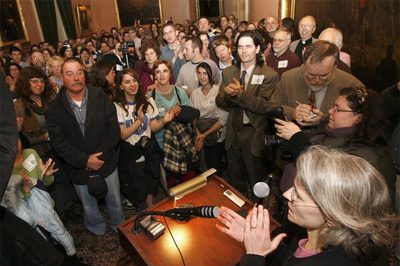Legislators in Vermont were expected to vote Thursday on a bill that would grant same-sex couples the right to marry in the state.
The House Judiciary Committee voted 8-2 Tuesday to send the bill to the floor for a vote.
Republican Gov. Jim Douglas pledged last week to veto the bill if it survives a House vote, but a two-thirds vote of both houses could override his veto.
The Senate overwhelmingly approved the legislation 26-4 on March 23, but it would also need 101 House votes to overcome a veto.
The House committee approved an amendment to the bill that clarifies the exemptions for religious institutions that do not accept same-sex nuptials. Because of the amendment, if the House approves the bill, it must return to the Senate for another vote or gain the approval of a joint House and Senate committee.
Since announcing his intent to veto the legislation, Douglas has been flooded with opposition from marriage-equality advocates.
Hundreds of LGBT and ally individuals gathered at the Statehouse late last week to protest Douglas’ position. The governor agreed to meet with about 80 of the supporters in his office March 27.

Beth Robinson, board chair of Vermont Freedom to Marry, said the contingent “made it clear to him that we are part of the Vermont community and we deserve fairness and equal treatment under the laws,” but that the governor did not indicate he was considering changing his position.
LGBT-rights supporters followed the governor to several public appearances last weekend, calling on him to reverse his decision to veto the bill.
The Associated Press reported this week that within the first two days after Douglas pledged to veto the legislation, he received about 1,500 letters and e-mails, most of which criticized his decision.
A Douglas spokesperson said that prior to his announcement, about 70 percent of the correspondence he received about the bill was in opposition to same-sex marriage; now, however, that number has dwindled to 40 percent.
An unscientific poll taken by Republican state Sen. William Doyle — a 40-year tradition the lawmaker undertakes to assess the public’s view on divisive social issues — found that 55 percent of residents felt that same-sex couples should have the right to marry. That number was just 32 percent in 1998.
Doyle voted in favor of same-sex marriage during the Senate vote.
Vermont became the first state in the country to legalize civil unions for same-sex couples in 2000 and, if the state approves same-sex marriage, it will become the first to do so through legislative means.
Connecticut, Massachusetts and California legalized gay marriage through judicial avenues.
The California Supreme Court decision legalizing same-sex marriage in the state was overturned by the ballot initiative Proposition 8 late last year. The court is currently considering legal challenges to Prop. 8.
Jen Colletta can be reached at [email protected].
